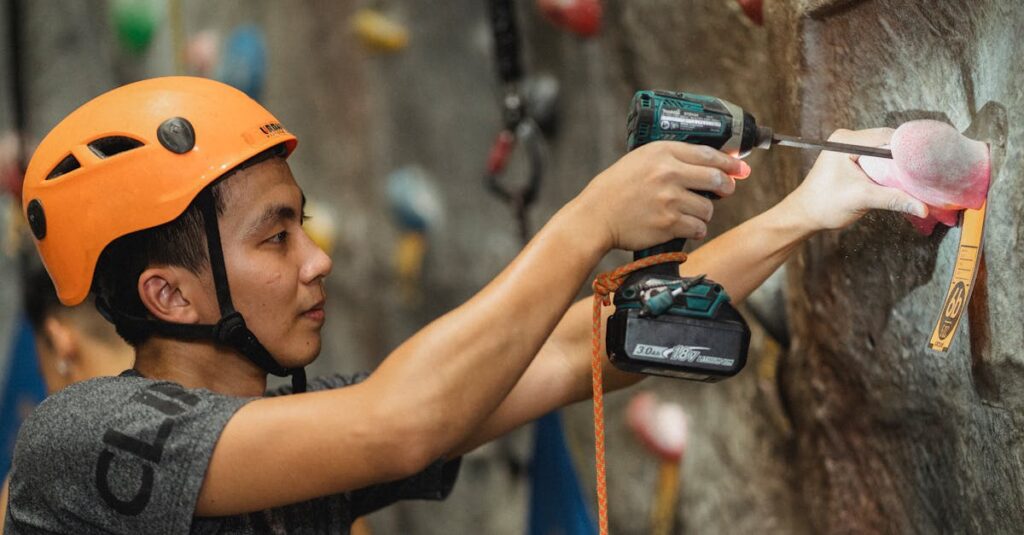In a world where athletic prowess reigns supreme, sport science courses are the secret sauce behind the champions. These programs dive deep into the science of movement, nutrition, and psychology, turning everyday enthusiasts into knowledgeable experts. Whether someone dreams of coaching the next Olympic athlete or simply wants to understand why their friend can run a marathon without breaking a sweat, sport science offers the keys to unlock those mysteries.
Imagine learning how to optimize performance while munching on a protein bar—it’s like being a superhero in sweatpants! With the right sport science education, one can blend passion with knowledge, making fitness not just a hobby but a career. So, if they’re ready to transform their love for sports into something extraordinary, sport science courses might just be the ticket to their next adventure.
Sport Science Courses
Sport science courses provide foundational knowledge essential for understanding athletic performance and the factors influencing it. These programs cover a broad range of topics, including biomechanics, exercise physiology, sport psychology, and nutrition. Each subject area offers insights into optimizing training techniques and enhancing overall physical health.
Students engage in hands-on experiences, which facilitate the application of theoretical concepts to real-world situations. Classes typically incorporate laboratory work, enabling learners to analyze movement patterns and assess physical fitness levels. Additionally, some institutions offer specialized certifications, which can bolster a graduate’s credentials in specific areas like strength and conditioning or sports nutrition.
A diverse curriculum supports career aspirations, whether one aims to work as a coach, fitness consultant, or sports therapist. Graduates find opportunities in various settings, including schools, professional sports teams, and fitness centers. Moreover, networking with industry professionals through internships enhances employability and opens doors to potential job placements.
Accredited programs ensure that participants receive quality education backed by leading research in the field. Institutions may also emphasize the importance of ongoing professional development, urging graduates to stay updated with the latest advancements in sports science. Financial aid or scholarships may be available to assist students in pursuing their education.
Choosing the right sport science program requires careful consideration of course offerings, faculty expertise, and campus resources. Prospective students should evaluate each program’s alignment with their career goals and personal interests. Ultimately, a comprehensive understanding of sport science fosters not only individual growth but also contributes positively to the broader sports community.
Benefits of Studying Sport Science
Studying sport science offers numerous advantages for individuals interested in athletics, fitness, and health. Enriched knowledge of the body and its functions can lead to effective training strategies and improved athletic performance.
Career Opportunities
Graduates of sport science programs find diverse career paths in fitness and athletics. Options include roles as personal trainers, sports coaches, nutritionists, and exercise physiologists. Professional sports teams and schools actively recruit individuals with sport science expertise. Many graduates leverage their education to work in rehabilitation settings, enhancing recovery processes for injured athletes. The growing focus on health and wellness increases demand for qualified professionals within the fitness industry. Flexibility in career choices empowers individuals to explore various sectors related to health and sports.
Academic Advancement
Pursuing sport science enhances academic credentials for further studies. Individuals may continue to advanced degrees in kinesiology, sports management, or exercise physiology. A solid foundation in sport science fosters critical thinking and research skills. Many students opt for specialized certifications to increase their marketability in specific areas such as nutrition or strength conditioning. Broader knowledge opens opportunities for interdisciplinary studies, benefiting those interested in holistic health approaches. Continuing education often leads to roles in academia, research, or advanced coaching positions, enhancing professional reputations in competitive environments.
Popular Sport Science Programs
Several popular sport science programs cater to diverse interests and career goals in the field. These programs offer students comprehensive knowledge and practical experience.
Undergraduate Options
Bachelor’s degrees in sport science often focus on foundational topics like exercise physiology and sport psychology. Students gain essential skills through hands-on laboratory work and internships. Universities frequently provide concentrations in areas such as coaching, fitness, or rehabilitation. Graduates from these programs pursue careers in personal training, coaching, and fitness management. Many institutions also emphasize the importance of accreditation through recognized organizations. Attending an accredited program enhances job prospects and academic credibility.
Graduate Programs
Master’s and doctoral programs in sport science delve deeper into specialized fields like biomechanics and rehabilitation sciences. Advanced coursework typically covers research methodologies and statistics in sports. These programs prepare graduates for professional roles in academia, research, or high-performance coaching. Opportunities for conducting original research also abound. Graduates excel as sports scientists, nutritionists, and university instructors. Networking connections with industry professionals during graduate studies can further enhance career prospects.
Key Components of Sport Science Curriculum
Sport science courses encompass a rich curriculum designed to equip students with essential skills and knowledge for success in the field. These programs emphasize both theoretical concepts and practical applications.
Theory and Practice
Understanding theoretical principles is crucial in sport science. Theories in biomechanics and exercise physiology provide a solid foundation for students. Practical applications, such as laboratory experiments and fieldwork, allow students to apply learned concepts in real-life scenarios. Engaging in these hands-on experiences solidifies comprehension and enhances critical thinking skills. Students can observe training techniques and assess performance metrics in real-time, bridging the gap between theory and practice effectively.
Specializations Available
Sports science degrees offer various specializations tailored to individual career aspirations. Common specializations include exercise physiology, nutrition, and biomechanics. Each area provides unique insights and expertise. Students may choose to focus on one particular domain to deepen their understanding or pursue a broader scope to enhance versatility. Additionally, emerging fields like sports analytics and rehabilitation sciences are gaining popularity. Engaging in specialized coursework not only boosts professional marketability but also fosters expertise in high-demand areas.
Choosing the Right Sport Science Course
Selecting a suitable sport science course involves evaluating various factors and utilizing available resources for research. Thoughtful considerations lead to informed choices that align with personal and professional goals.
Factors to Consider
Accreditation ranks among the top priorities when choosing a program. Accredited courses ensure quality education, improving job prospects for graduates. Specializations within sport science should also align with career aspirations; options range from exercise physiology to sports analytics. Location plays a role too; proximity to leading sports organizations offers valuable networking opportunities. Financial investment in education is essential; potential students should assess tuition costs against expected returns in employment. Coursework’s practical experience is crucial, as hands-on learning reinforces theoretical knowledge and prepares students for real-world applications.
Resources for Research
Numerous online platforms provide insights into sport science programs. Websites like Study.com and Peterson’s offer comprehensive lists and reviews of various courses. University websites often publish detailed program descriptions, faculty qualifications, and curriculum outlines. Social media platforms, including LinkedIn and Facebook, host groups dedicated to sport science discussions where prospective students can connect with current students and professionals. Additionally, attending education fairs showcases multiple programs in one setting, facilitating direct communication with representatives. Utilizing these resources creates a well-rounded perspective, enhancing decision-making for aspiring sport science students.
Sport science courses offer a unique opportunity to merge passion with profession. By equipping students with essential knowledge in areas like biomechanics and nutrition, these programs prepare them for diverse and rewarding careers in the fitness industry. Graduates can confidently step into roles that not only enhance their own athletic pursuits but also contribute to the success of others.
Choosing the right program is crucial for aligning personal interests with career goals. With the growing demand for qualified professionals in this field, pursuing a sport science education is more than just an academic endeavor; it’s a pathway to making a significant impact in the world of sports and fitness. Embracing this journey can lead to fulfilling experiences and a lasting legacy in the sports community.



